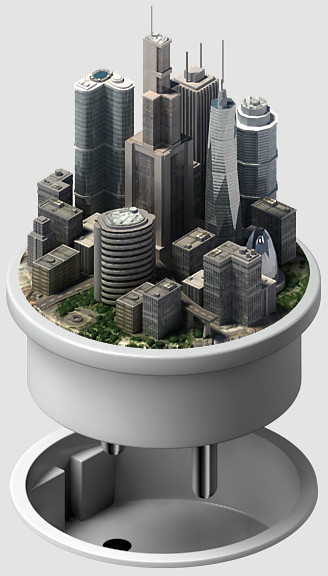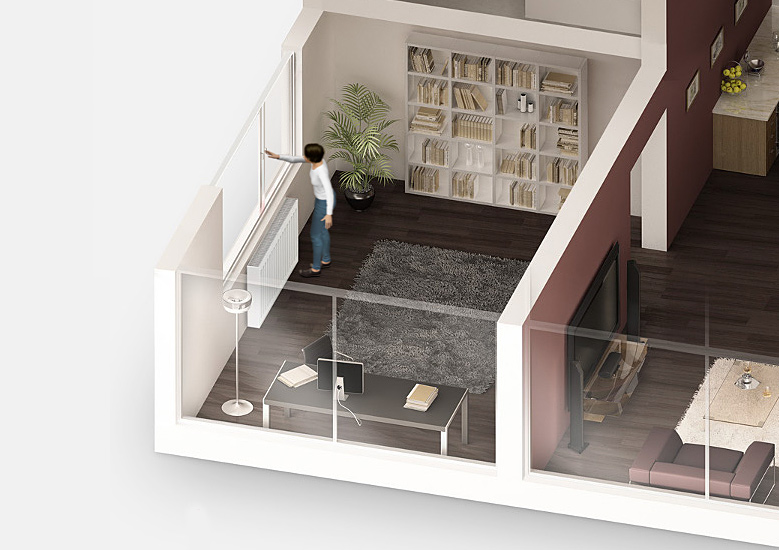Climate killer coal
40%
40 percent of the electricity produced
worldwide is generated with coal, one of
the most harmful sources.
Smart grid
Smarter energy,
Smarter energy,
greener planet
To save the world's climate, we need smart electricity. And a good fairy.
- Imagine a good fairy appeared to you. She grants you one wish to save the world's climate. No matter what you wish for, she'll do it. But you only have one wish.
- What would you wish for? Would you make everyone go vegetarian? Well, that would be a good start. And would solve the world's hunger problems, too. But the most effective measure would be getting rid of all the coal-burning power plants on the planet. 85 percent of CO₂ emissions in Germany alone are produced by energy generation. And the most CO₂ comes from the smokestacks of coal-fired power plants.
If you replaced these polluters with clean wind and solar power, you'd lift a tremendous burden from the world's climate. And you'd even create jobs for 20 million people, according to a calculation by Greenpeace. What's more: if we master the global energy revolution, we wouldn't have to invest in coal any more. According to Greenpeace, the money saved would be enough to finance the energy revolution worldwide.
But as is so often the case in matters related to the energy revolution, it isn't as easy as that. What happens when the sun isn't shining and the wind isn't blowing? Will the lights go out then? After all, the sun and the wind don't ask us when we need the electricity.
What happens when the sun
isn't shining and the wind
isn't blowing? Will the
lights go out then?
- To ensure the lights don't go out when the sky gets cloudy or there's a lull in the wind, we need two innovations in the electricity grid: the first element is the possibility of storing electricity whenever more wind and solar power than we need is being produced. This storage could be provided by electric cars or e-bikes in our garages, for example. The stored energy could then be used after sunset, for example, to illuminate our homes or heat up your tomato soup and tee. But what if we want to wash and dry our clothes as well, and the stored energy isn't enough? That's why we need a second element: a smart grid for electricity. It needs to make it possible to match electricity production with electricity demand in real time.
- If a stiff breeze blows across the countryside, the wind turbines report increased electricity production to consumers. The smart washing machines in thousands of households literally "get wind" of this increased production in the smart grid and immediately start the wash program – assuming, of course, that they've been packed with laundry and detergent beforehand. The stiff breeze is turned into clean laundry in an especially climate-friendly way. Likewise, after sunset, the solar power plants notify the washing machines that there isn't a lot of power available in the grid. We consumers can choose to pay a higher price for electricity – the smart grid makes it possible to change electricity prices over the day, depending on the supply due to the weather conditions. If we're willing to pay a higher price, we can do our laundry in the evening with the remaining electricity from biogas plants, gas power plants, or cogeneration units, for example. Or we can adapt our habits to the weather and enjoy especially cheap, climate-friendly laundry. The smart grid works like an "automated electricity bazaar" that rewards us financially for using energy sustainably.
Can the Internet even
cope with billions of
new connected devices
in the smart grid?
- The billions of new devices that will be connected in the smart grid do pose an incredible challenge to the Internet's infrastructure. Not only due to their sheer numbers, but also – and especially – because of the enormous amounts of communication data that has to be transmitted in real time. To make this possible, Deutsche Telekom is digging like never before: the upgrade to 5G, the next network generation, is fully underway and is the biggest build-out in the company's history. Deutsche Telekom laid more than 40,000 kilometers of fiber-optic cables in 2017 alone – and that's just in Germany. 5G is slated to launch in 2020 and will deliver many more exciting benefits as well. By the way, together with the City of Dresden and TU Dresden, Deutsche Telekom is developing a new test area to trial the smart grid with 5G.
Learn more

And what
can we do?
- You can do a great deal to fight climate change in the comfort of your own home: simply by saving energy. Dry your laundry in the open air, for example, instead of in the dryer. That will save an average of 2.3 kg CO₂ on every load! Another easy way to save energy at home is with smart home applications. That's especially true for heating, which accounts for the most energy consumed. In a smart home, your radiators can be programmed to switch off automatically when you leave the home or open a window for ventilation.
Significant CO₂ savings can also be achieved through lighting. If you set reading mode on your app, for example, your reading lamp will switch on bright, while all other lights automatically get dimmer and save energy. Another practical tool that's also good for the environment is a wall switch that lets you turn off the lights in all rooms with a single click when you leave the house.
Smart power meters help you identify potential electricity hogs in your household, because they show you exactly which of your devices consume the most power. Deutsche Telekom offers Qivicon, an extensive smart home platform. To find out exactly how it works, click here.

Save energy in the smart home
Say goodbye to light switches and radiator thermostats.
The smart home saves you a lot of work, as well as
energy. Visit the interactive Smart Home